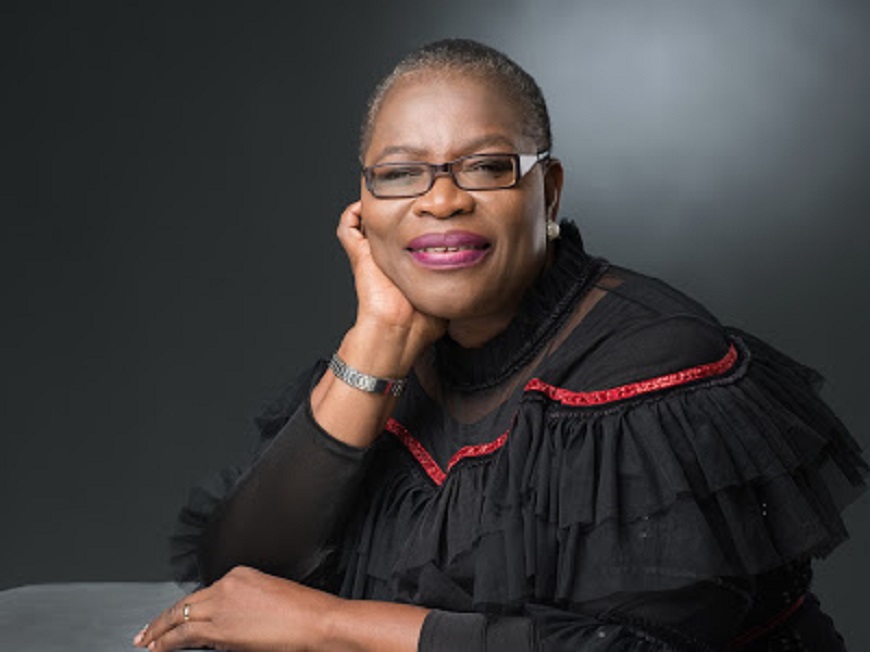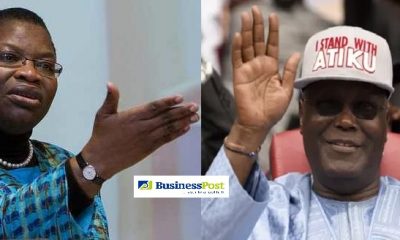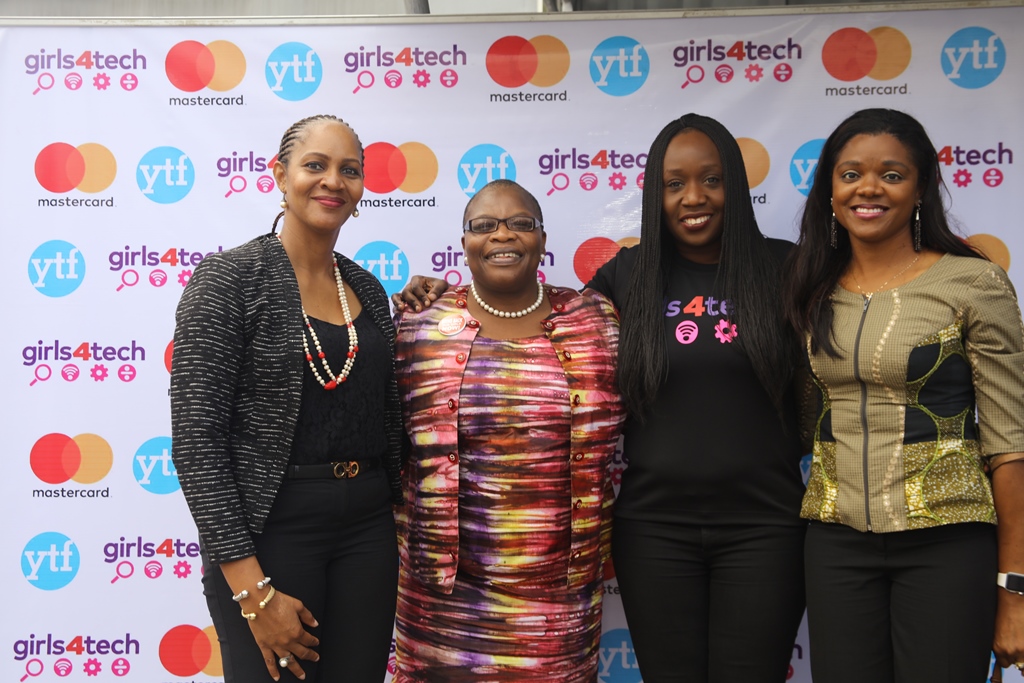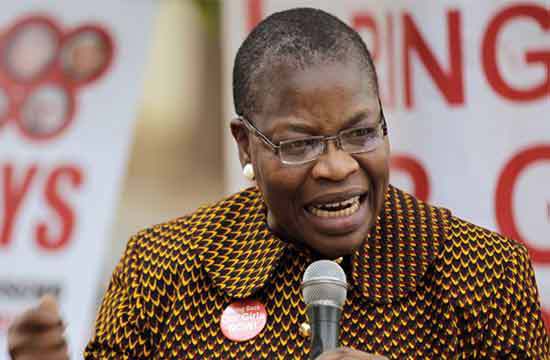Feature/OPED
Why Nigerians Should Vote Ezekwesili as President in 2019

By Nneka Okumazie
Nigeria is stuck in underdevelopment because of lack of great ideas. People often think corruption, leadership, or other factors. NO! It is lack of great ideas.
All the problems Nigeria has outsizes all the ideas and project, presented and developed as solutions. Nigeria is not bustling with ideas or serious projects at major problems.
There are challenges Nigeria has that many have concluded as unsolvable. So no one touches or speaks seriously about them.
What Nigeria has in abundance are vague ideas, simplistic crosslinking of do this, get that. Ideas to solve Nigeria’s problems are so cheap that they are almost always discussed informally, in the most inappropriate places.
Usually, for a country to develop there has to be a structured idea-test-revision-deployment system – at several centres focused on solutions to problems. They generate proposals internally, or request for them, they select, do studies, get findings, modify their initial path, and publish – something relatable.
Assuming Nigeria had this, there would have been so many great [workable, sustainable, affordable] project implementations against power outages, corruption, poverty, unemployment, grim public health, unsafe roads, traffic congestion, poor infrastructure, hunger, insecurity, dismal intergenerational economic mobility, etc.
Rather, Nigeria has complains, insults, first-rate blame game, showoffs, etc. and many seem comfortable, when great at those.
Government has who and what to blame, the private sector has who and what to blame, universities have who and what to blame, etc.
The best thing any government would have done was to embolden a great idea system – funding centres across the country – focused on issues that have plagued Nigeria for years. But government seems uninterested.
The private sector could have also taken this up, as part of their giving back to society, to either fund potent studies on solutions, or fund centres, or carry out some themselves, but nothing as well.
So things that were bad continue to get worse. Opportunities in the past that would have met preparation – so that progress can happen, were lost.
And leadership is recycled. Many who proposed new leadership, for development, often attack some who try, because they think they don’t stand a chance, but how does change happen without a try?
One of the worst attacks against Presidential aspirant, Oby Ezekwesili, is that she stands no chance, so she shouldn’t try. This
[dead-on-arrival]
assumption is often from those in the vague ideas class, who offer nothing new, or valuable.
She, as a fierce activist, took on a campaign for several abducted girls and was often excited as some got out. She stuck out her neck, kept the spotlight on the issue, during an administration of the same political party, as the one which she served.
She could have used the previous election as an opportunity to join the opposition, run, or join forces with that administration. But she didn’t. Her political candidacy came up at a time her activism cooled. She isn’t running on that pedestal.
She’s arguably the best candidate that would make Nigeria a society of great progress, with failure-resistant ideas, studies and project against challenges. She would be that inspiring leader to nudge the public and private sectors towards making useful, measurable development in major problem areas.
Her administration would make lots of inconvenient policies and projects for advancement. Often times, government projects are convenient ones: projects that aren’t – much of – a burden on the Nigerian-factor system.
Rail lines are necessary infrastructure, and many more are needed. But some of the recently launched ones are part of the convenient projects that government did – that also serves the ‘doing’ optics.
Telecommunication licenses at the time could also be categorized as convenient projects – important and useful – for civilization but, convenient. There are countable projects across states, local and federal governments, in any term, that were inconvenient to that government: projects with massive benefit and completeness [as solved] for the people and place.
Ezekwesili is likely to be the leader who encourages democratization of great ideas – to allow them to root out problems.
Yes, technology can improve accountability and transparency against corruption, but just saying technology as a solution to corruption, in Nigeria, is ambiguous.
There are other necessary checks, and there are several people who may know what great ideas to propose, or implement, based on their perspective, how they are inspired, or their experience.
All of these would be published, and tested at one local government, or state government, or wherever. All state governments cannot be equally unyielding at the same time.
This is probably how Nigeria can make progress: a process that starts with very little capital, but powerful enough for change and momentum.
Some can say, but she can do whatever she wants to do without being the President, OK. But why can’t she run – if there’s an election – especially when Presidency is a better place to make things happen?
Some people have said that it is waste of vote, because she can’t win, since she’s not known by people who are not educated. OK. But, what if majority of educated people voted for her? What if all the educated people would tell those they know are not educated that there is a passionate candidate for development you could vote for? What if women decided that it is time to put a woman at the helm?
Assuming educated people voted for her, and somehow she didn’t get all the required votes, her bloc of ideas supporters could be forceful enough to make whoever emerges be more accountable. They could also become a force for change, from without. But people have to – first – vote for her, to win.
Yes, there’s a management consultant, a star journalist, and a finance expert, running. They have the right to try, and they all stand a chance, regardless of what it seems or whatever anyone thinks. But Ezekwesili is the contiguous warrior, never for self. She’s far likelier to prioritize development than any of the current candidates.
She’s also likely to find solutions to issues that are not mainstream underdevelopment problems, especially on women issues. The abundance of direct and indirect prostitution is alarming, no solution or great idea in sight. A Madam President would be able to find ways to taper both.
The backwardness of Nigeria is so painful. The hopelessness is so pathetic. There is supposed to be a rush to finding solutions, instead everyone seems distracted.
There are so many Nigerians stranded – and in tough situations – abroad. It is not that for many of them there is a direct hurt if they returned home, but the hopelessness induces so much fear, they would rather stay there, stay crushed than come home. This too is a problem.
So while there are all these major sector problems, there are quiet problems affecting people that great ideas could solve.
No wonder Churches are abundant in Nigeria, because the true ones are like Hope Hospitals, or Hope Therapy Clinics, so that people can find a reason to look forward to life, against all the emptiness, uncertainty and problems – sometimes – before them. And yes, it is not the Church that causes poverty.
Income, purchasing power [of that income], and conditions of living are responsible for poverty in Nigeria. There could have been studies on how to improve the conditions of living in certain houses with tens of individuals sharing bathrooms. There could have been studies on how to grow income, etc.
Maybe Ezekwesili would become the next president of Nigeria, maybe not. But she is the best right now, to change Nigeria for good – a status the country desperately needs, because the cracks are abundant, and it is time they stopped. Because of her ideas, her passion for great ideas, her energy, her experience, her achievements, her integrity, her relentlessness and selflessness, it is very important to consider to support her candidacy and to cast the vote for her.
Feature/OPED
How Christians Can Stay Connected to Their Faith During This Lenten Period

It’s that time of year again, when Christians come together in fasting and prayer. Whether observing the traditional Lent or entering a focused period of reflection, it’s a chance to connect more deeply with God, and for many, this season even sets the tone for the year ahead.
Of course, staying focused isn’t always easy. Life has a way of throwing distractions your way, a nosy neighbour, a bus driver who refuses to give you your change, or that colleague testing your patience. Keeping your peace takes intention, and turning off the noise and staying on course requires an act of devotion.
Fasting is meant to create a quiet space in your life, but if that space isn’t filled with something meaningful, old habits can creep back in. Sustaining that focus requires reinforcement beyond physical gatherings, and one way to do so is to tune in to faith-based programming to remain spiritually aligned throughout the period and beyond.
On GOtv, Christian channels such as Dove TV channel 113, Faith TV and Trace Gospel provide sermons, worship experiences and teachings that echo what is being practised in churches across the country.
From intentional conversations on Faith TV on GOtv channel 110 to true worship on Trace Gospel on channel 47, these channels provide nurturing content rooted in biblical teaching, worship, and life application. Viewers are met with inspiring sermons, reflections on scripture, and worship sessions that help form a rhythm of devotion. During fasting periods, this kind of consistent spiritual input becomes a source of encouragement, helping believers stay anchored in prayer and mindful of God’s presence throughout their daily routines.
To catch all these channels and more, simply subscribe, upgrade, or reconnect by downloading the MyGOtv App or dialling *288#. You can also stream anytime with the GOtv Stream App.
Plus, with the We Got You offer, available until 28th February 2026, subscribers automatically upgrade to the next package at no extra cost, giving you access to more channels this season.
Feature/OPED
Turning Stolen Hardware into a Data Dead-End

By Apu Pavithran
In Johannesburg, the “city of gold,” the most valuable resource being mined isn’t underground; it’s in the pockets of your employees.
With an average of 189 cellphones reported stolen daily in South Africa, Gauteng province has become the hub of a growing enterprise risk landscape.
For IT leaders across the continent, a “lost phone” is rarely a matter of a misplaced device. It is frequently the result of a coordinated “snatch and grab,” where the hardware is incidental, and corporate data is the true objective.
Industry reports show that 68% of company-owned device breaches stem from lost or stolen hardware. In this context, treating mobile security as a “nice-to-have” insurance policy is no longer an option. It must function as an operational control designed for inevitability.
In the City of Gold, Data Is the Real Prize
When a fintech agent’s device vanishes, the $300 handset cost is a rounding error. The real exposure lies in what that device represents: authorised access to enterprise systems, financial tools, customer data, and internal networks.
Attackers typically pursue one of two outcomes: a quick wipe for resale on the secondary market or, far more dangerously, a deep dive into corporate apps to extract liquid assets or sellable data.
Clearly, many organisations operate under the dangerous assumption that default manufacturer security is sufficient. In reality, a PIN or fingerprint is a flimsy barrier if a device is misconfigured or snatched while unlocked. Once an attacker gets in, they aren’t just holding a phone; they are holding the keys to copy data, reset passwords, or even access admin tools.
The risk intensifies when identity-verification systems are tied directly to the compromised device. Multi-Factor Authentication (MFA), widely regarded as a gold standard, can become a vulnerability if the authentication factor and the primary access point reside on the same compromised device. In such cases, the attacker may not just have a phone; they now have a valid digital identity.
The exposure does not end at authentication. It expands with the structure of the modern workforce.
65% of African SMEs and startups now operate distributed teams. The Bring Your Own Device (BYOD) culture has left many IT departments blind to the health of their fleet, as personal devices may be outdated or jailbroken without any easy way to know.
Device theft is not new in Africa. High-profile incidents, including stolen government hardware, reinforce a simple truth: physical loss is inevitable. The real measure of resilience is whether that loss has any residual value. You may not stop the theft. But you can eliminate the reward.
Theft Is Inevitable, Exposure is Not
If theft cannot always be prevented, systems must be designed so that stolen devices yield nothing of consequence. This shift requires structured, automated controls designed to contain risk the moment loss occurs.
Develop an Incident Response Plan (IRP)
The moment a device is reported missing, predefined actions should trigger automatically: access revocation, session termination, credential reset and remote lock or wipe.
However, such technical playbooks are only as fast as the people who trigger them. Employees must be trained as the first line of defence —not just in the use of strong PINs and biometrics, but in the critical culture of immediate reporting. In high-risk environments, containment windows are measured in minutes, not hours.
Audit and Monitor the Fleet Regularly
Control begins with visibility. Without a continuous, comprehensive audit, IT teams are left responding to incidents after damage has occurred.
Opting for tools like Endpoint Detection and Response (EDR) allows IT teams to spot subtle, suspicious activities or unusual access attempts that signal a compromised device.
Review Device Security Policies
Security controls must be enforced at the management layer, not left to user discretion. Encryption, patch updates and screen-lock policies should be mandatory across corporate devices.
In BYOD environments, ownership-aware policies are essential. Corporate data must remain governed by enterprise controls regardless of device ownership.
Decouple Identity from the Device
Legacy SMS-based authentication models introduce avoidable risk when the authentication channel resides on the compromised handset. Stronger identity models, including hardware tokens, reduce this dependency.
At the same time, native anti-theft features introduced by Apple and Google, such as behavioural theft detection and enforced security delays, add valuable defensive layers. These controls should be embedded into enterprise baselines rather than treated as optional enhancements.
When Stolen Hardware Becomes Worthless
With POPIA penalties now reaching up to R10 million or a decade of imprisonment for serious data loss offences, the Information Regulator has made one thing clear: liability is strict, and the financial fallout is absolute. Yet, a PwC survey reveals a staggering gap: only 28% of South African organisations are prioritising proactive security over reactive firefighting.
At the same time, the continent is battling a massive cybersecurity skills shortage. Enterprises simply do not have the boots on the ground to manually patch every vulnerability or chase every “lost” terminal. In this climate, the only viable path is to automate the defence of your data.
Modern mobile device management (MDM) platforms provide this automation layer.
In field operations, “where” is the first indicator of “what.” If a tablet assigned to a Cape Town district suddenly pings on a highway heading out of the city, you don’t need a notification an hour later—you need an immediate response. An effective MDM system offers geofencing capabilities, automatically triggering a remote lock when devices breach predefined zones.
On Supervised iOS and Android Enterprise devices, enforced Factory Reset Protection (FRP) ensures that even after a forced wipe, the device cannot be reactivated without organisational credentials, eliminating resale value.
For BYOD environments, we cannot ignore the fear that corporate oversight equates to a digital invasion of personal lives. However, containerization through managed Work Profiles creates a secure boundary between corporate and personal data. This enables selective wipe capabilities, removing enterprise assets without intruding on personal privacy.
When integrated with identity providers, device posture and user identity can be evaluated together through multi-condition compliance rules. Access can then be granted, restricted, or revoked based on real-time risk signals.
Platforms built around unified endpoint management and identity integration enable this model of control. At Hexnode, this convergence of device governance and identity enforcement forms the foundation of a proactive security mandate. It transforms mobile fleets from distributed risk points into centrally controlled assets.
In high-risk environments, security cannot be passive. The goal is not recovery. It is irrelevant, ensuring that once a device leaves authorised hands, it holds no data, no identity leverage, and no operational value.
Apu Pavithran is the CEO and founder of Hexnode
Feature/OPED
Daniel Koussou Highlights Self-Awareness as Key to Business Success

By Adedapo Adesanya
At a time when young entrepreneurs are reshaping global industries—including the traditionally capital-intensive oil and gas sector—Ambassador Daniel Koussou has emerged as a compelling example of how resilience, strategic foresight, and disciplined execution can transform modest beginnings into a thriving business conglomerate.
Koussou, who is the chairman of the Nigeria Chapter of the International Human Rights Observatory-Africa (IHRO-Africa), currently heads the Committee on Economic Diplomacy, Trade and Investment for the forum’s Nigeria chapter. He is one of the young entrepreneurs instilling a culture of nation-building and leadership dynamics that are key to the nation’s transformation in the new millennium.
The entrepreneurial landscape in Nigeria is rapidly evolving, with leaders like Koussou paving the way for innovation and growth, and changing the face of the global business climate. Being enthusiastic about entrepreneurship, Koussou notes that “the best thing that can happen to any entrepreneur is to start chasing their dreams as early as possible. One of the first things I realised in life is self-awareness. If you want to connect the dots, you must start early and know your purpose.”
Successful business people are passionate about their business and stubbornly driven to succeed. Koussou stresses the importance of persistence and resilience. He says he realised early that he had a ‘calling’ and pursued it with all his strength, “working long weekends and into the night, giving up all but necessary expenditures, and pressing on through severe setbacks.”
However, he clarifies that what accounted for an early success is not just tenacity but also the ability to adapt, to recognise and respond to rapidly changing markets and unexpected events.
Ambassador Koussou is the CEO of Dau-O GIK Oil and Gas Limited, an indigenous oil and natural gas company with a global outlook, delivering solutions that power industries, strengthen communities, and fuel progress. The firm’s operations span exploration, production, refining, and distribution.
Recognising the value of strategic alliances, Koussou partners with business like-minds, a move that significantly bolsters Dau-O GIK’s credibility and capacity in the oil industry. This partnership exemplifies the importance of building strong networks and collaborations.
The astute businessman, who was recently nominated by the African Union’s Agenda 2063 as AU Special Envoy on Oil and Gas (Continental), admonishes young entrepreneurs to be disciplined and firm in their decision-making, a quality he attributed to his success as a player in the oil and gas sector. By embracing opportunities, building strong partnerships, and maintaining a commitment to excellence, Koussou has not only achieved personal success but has also set a benchmark for future generations of African entrepreneurs.
His journey serves as a powerful reminder that with determination and vision, success is within reach.
-

 Feature/OPED6 years ago
Feature/OPED6 years agoDavos was Different this year
-
Travel/Tourism10 years ago
Lagos Seals Western Lodge Hotel In Ikorodu
-

 Showbiz3 years ago
Showbiz3 years agoEstranged Lover Releases Videos of Empress Njamah Bathing
-

 Banking8 years ago
Banking8 years agoSort Codes of GTBank Branches in Nigeria
-

 Economy3 years ago
Economy3 years agoSubsidy Removal: CNG at N130 Per Litre Cheaper Than Petrol—IPMAN
-

 Banking3 years ago
Banking3 years agoSort Codes of UBA Branches in Nigeria
-

 Banking3 years ago
Banking3 years agoFirst Bank Announces Planned Downtime
-

 Sports3 years ago
Sports3 years agoHighest Paid Nigerian Footballer – How Much Do Nigerian Footballers Earn

















